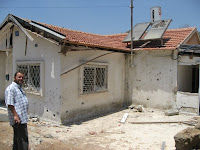Until a few years ago, Israelis could have bank overdrafts without large charges, like in the US. When one uses a credit cards here, the clerk asks if the user wants to pay in three payments or all at once, so people are used to pushing the limit when spending money. Also, Israelis rarely use registers to keep track of what they spend or balance their bank accounts monthly. Pamonim was created to help working couples in debt learn to reduce their spending and to budget. It also provides zero-interest loans to some clients.
Sderot , founded in 1951, is a town not much bigger than Kiryat Malachi. It is located less than two miles east of Gaza. It had close to 30,000 inhabitants at one time, but the true population now is closer to 25,000. Sapir College is located just outside the town as is the regional secondary school, Shaar HaNegev. Many teens from the Hof Ashkelon region attend high school there.
Some people in town suffered severe hearing loss when they were close to where the qassams landed. Yaffa managed to connect them to a Hearing Aide institute which helped them get funding for the hearing aides from a local cell phone company. That in addition to what they get from a national plan and part from Pamonim helped 15 hearing-impaired gather the 5,000 ($1600) for the hearing aides. (Each did pay a small amount too--$130 shekels.)
Unfortunately, now Pamonim has no more funds for this kind of support though there are other families in need Yafa focuses now on 20+ families that are learning to budget. She works with both husband and wife to lower expenditures and to learn to be responsible for their financial life. Some wives do not work, and it becomes clear they need to get jobs. Pamonim helps these women build resumes. If any reader wants to give a donation to Pamonim in Sderot to help with any of its projects, checks in the US can be sent to:
c/o Yeshiva Yad Moishe
1520 39th Street
Brooklyn, NY 11218-4414
Yafa took us to her office, told us more about what she had done the past year, and gave us a tour of places recently hit by qassam rockets. Qassams are simple steel rockets filled with explosives, produced by different groups in Gaza. They are made in small factories (usually in houses or connected to them) and have a maximum range of 6 miles. They are free-flying artillery rockets lacking any guidance system. When they hit, part of them explodes and send out pieces of shrapnel. Cars explode when hit. Qassams were first fired at Israeli targets in October, 2001. The first time an Israeli city was hit was in Sderot in March, 2002. By November, 2007, 6311 rockets had fallen in town.
See http://en.wikipedia.org/wiki/Sderot%2C_Israel for more details. Hamas is not firing them during this temporary calm. The Al Aksa Brigade (a Fatah splinter group) is claiming credit for the ones fired, breaking the cease fire.
We saw a home where a qassam recently landed



The first picture shows where the qassam landed. In the second picture, the Pamonim volunteer is standing just to the right of where the qassam landed. In the third, you can see the damaged solar panels too.

A qassam fell through the roof of this home. Luckily no one was hurt, but the structure cannot be saved.
At the town police station, we saw a collection of spent qassams, each one with the date shot and the place where it landed.


It was chilling to see them in one place and to know that close to 7000 have fallen in and around this one town.There does not see an end in sight to qassams falling in the area. Still new neighborhoods are being built and new people moving in, many of whom are religious. In one new area, the new playground includes what looks like big concrete culverts, more than two meters in diameter, that will soon be painted bright colors. Children can play and run through them but the structures will also has a practical use -- bomb shelters.






No comments:
Post a Comment